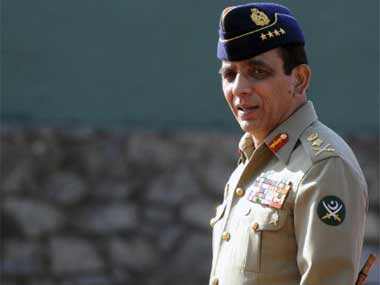New York: One year after the stunning raid that killed Osama bin Laden, the Pakistani army still willingly or unwillingly lets a rogue’s gallery of terrorists wanted in India and the US live large. What is striking, say analysts, is how little has changed in Pakistan and how the military establishment remains addicted to using, or tolerating, Islamic extremist groups as its proxy warriors. Several prominent analysts, and not the least among them, Pakistani defence analyst Ayesha Siddiqa identified the 2 May US commando raid that killed bin Laden as a missed opportunity for the civilian government to curb the power of the army which calls the shots in Pakistan. [caption id=“attachment_188762” align=“alignright” width=“380” caption=“The power balance is still weighted in favour of the Pakistan Army. AFP”]  [/caption] “In the immediate aftermath of the US raid on Abbottabad, some Pakistanis wondered if the civilian government could seize upon the military’s embarrassment to establish greater control over the military. Aside from some small shifts, the answer a year later is no,” noted The Christian Science Monitor. After the US raid, Pakistan was in churn. The Pakistani government initially welcomed the raid that killed bin Laden in Abbottabad, but within hours the mood soured as it became clear Pakistan’s army was cut out of the US Navy SEAL operation. The whole world pointed fingers at the military. The idea that bin Laden could live in Abbottabad without the military and ISI’s knowledge strained credibility. Pakistanis were furious that the army was caught napping and allowed the US Navy Seals to enter the country to carry out a bold operation straight out of the movies. Surely, President Asif Ali Zardari’s civilian government could have used this anger directed at the Pakistani Army to cut General Ashfaq Parvez Kayani down to size. Siddiqa, who has who has been a professor of Military Science at the Johns Hopkins University and the Pakistan Scholar at the Woodrow Wilson International Center for Scholars at Washington, identified the raid as a “unique opportunity” for the Zardari government to check the power of the military. “That was a very short window – no more than 48 hours, in fact. In hindsight, it leaves one wondering whether there was any window at all. To be honest, political forces were taken by surprise that day. I don’t think they had a strategy that could deal with this opportunity,” she told The Christian Science Monitor. The US magazine pointed out that “it was an opportunity that Pakistan only held once before in 1971 when the military lost half the country in a war with India that led to the new state of Bangladesh.” Pakistan’s proxy warriors The Abbottabad raid was a PR disaster for the Pakistani Army but it has rebounded since and is ruling the roost. It barred North Atlantic Treaty Organization (NATO) convoys in November from moving supplies meant for soldiers in Afghanistan through Pakistan after US forces mistakenly fired on two Pakistan border posts, killing 24 soldiers. In Pakistan, the Zardari government has little influence over security policy, which is run by the military and the Inter-Services Intelligence Directorate (ISI). Since the 1980s, the army and the ISI have backed jihadist groups as a way to push action without having to do anything too overtly, first in Afghanistan and in Kashmir. American intelligence believes current al-Qaida chief Ayman al-Zawahiri who was bin Laden’s deputy and Afghan insurgent leaders Sirajuddin Haqqani and Mullah Mohammad Omar are likely somewhere in Pakistan. Lashkar-e-Taiba terrorist group founder Hafiz Saeed, who is wanted for plotting the 2008 Mumbai attacks, is a very public figure in Pakistan. The Obama administration put Saeed on its most wanted list in April, announcing a $10 million bounty leading to his arrest and prosecution. With the impending 2014 deadline for the withdrawal of US soldiers from Afghanistan, the Pakistani Army is likely to do nothing to go after jihadist groups.
One year after the stunning raid that killed Osama bin Laden, the Pakistani army still willingly or unwillingly lets a rogue’s gallery of terrorists wanted in India and the US live large.
Advertisement
End of Article


)

)
)
)
)
)
)
)
)



